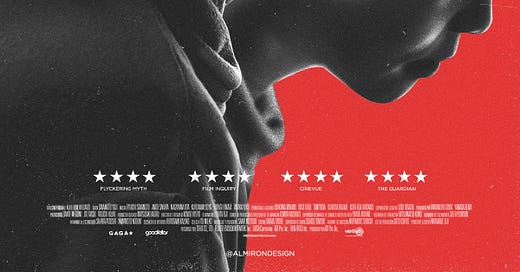If the medium is the message, then Hirokazu Kore-eda’s primary concerns in Monster are disconnectedness, the impossibility of true communication and social hypocrisy — ideas he explores not just in his film’s plot, but also, indeed perhaps mainly, through its twisted, fractured structure, in which extended flashbacks present key events from multiple points of view.
At its start, Monster would seem to be the story of a young boy, Minato, being mistreated by one of his teachers. His single-parent mother reports the matter to the school and demands appropriate action. She faces a barrier of unflappable social conventions — the Headteacher endlessly states that her concerns are being taken seriously, without appearing to do anything about them — while Minato’s behaviour becomes increasingly worrying and erratic. But just when the drama threatens to follow a predictably conventional route, Kore-eda gives us the first of the flashbacks, allowing us to see the situation from the teacher’s perspective.
As the tale progresses, it becomes increasingly complex, encompassing not just the teacher’s life, but also the Head’s (is she hiding a deadly secret which may have some bearing on how she’s dealing with the abuse allegations?) and, crucially, one of the young protagonist’s classmates, who is himself experiencing a torrent of bullying from other children at the school. How, and whether, all this ties in with a destructive landslide and a fire at a ‘hostess bar’ are questions with which the director successfully teases us all the way to his story’s conclusion.
Very much in the vein of ‘social dilemma’ dramas like those by Asghar Farhadi, Monster serves as a depressing reminder that very few such films are being made by the English-speaking branches of the cinema industry these days. Not long ago, stories of normal people living ordinary, if dramatically heightened, lives weren’t unusual. But in this post-Marvel age, there appears to be much less room for ‘everyday’ narratives. Thank goodness, then, that Kore-eda is still being permitted to do his thing, because Monster must surely be one of his finest and most convincing dissections of the minutiae of social interactions and of the potentially devastating consequences of seemingly banal occurrences.
Perhaps with the exception of one character (although it’s likely even he hides a pained past) all of the people in Monster are essentially flawed and well-meaning, stumbling from one mistake to the next as best they can, trying to live within the constraints of a complicated social reality. And it is precisely as an examination of contemporary Japan that the film is perhaps most praiseworthy, depicting the many rules and conventions as a dangerous, if not lethal, bind on self-expression, honesty and, in some senses, basic humanity. This is a territory Kore-eda has explored before (notably in Shoplifters and Nobody Knows) but here, the critique of his country feels even sharper and angrier — a cry of anguish, almost, against systems and structures that have an impact not just on how people relate to others but on how they view themselves and their own worth.
Stopping all this from becoming too pessimistic is the nuanced realism of the film’s central performances. Sakura Ando as Minato’s mother adds a burst of much-needed, sparky energy to the screen, even if her character’s attempts to challenge the status quo are often ineffectual. Eita Nagayama as the accused teacher, Hiro, pulls off a tough role with deceptive ease, shifting from gauche awkwardness to warmth to eyebrow-raising suspiciousness with total conviction. And Soya Kurokawa and Hinata Hiiragi as Minato and his friend somehow manage to convey both innocence and world-weariness as they negotiate the growing strangeness of the world around them. Ryuichi Sakamoto’s score — reportedly the final one he composed before his death — is invaluable too, eschewing easy, memorable melodies in favour of splintered, atmospheric snatches of tunes — scatterings of notes forever failing to cohere into a whole.
There are a few sequences in which Monster’s plot feels as though it’s serving the director’s need for thematic expression rather than developing organically: a couple of the incidents appear to serve little narrative purpose and consequently come across as a touch contrived. But they’re a small price to pay for a piece of work which displays such tremendous levels of generosity, compassion and understanding towards nearly all the people it portrays, regardless of how monstrous they may appear to be.
Dariush






Putting it on my list, thank you!
I’ve been meaning to watch this! Now I definitely will! Thank you!